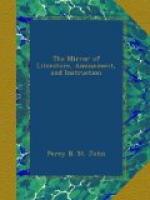We have not the Church History at hand, but Fuller, in his Worthies, says, “Bray is a village well known in Barkshire, the vivacious Vicar whereof, living under King Henry the Eighth, King Edward the Sixth, Queen Mary, and Queen Elizabeth, was first a Papist, then a Protestant, then a Papist, then a Protestant again. This Vicar being tax’t by one for being a turncoat, not so (said he) for I always kept my principles, which is this, to live and die Vicar of Bray.”
Lastly, here is the song:—
THE VICAR OF BRAY.
In good King Charles’s golden days,
When loyalty had no harm in’t,
A zealous high-churchman I was,
And so I got preferment.
To teach my flock I never miss’d:
Kings are by God appointed;
And those are damn’d that do resist,
And touch the Lord’s
anointed:
And this is law,
I will maintain
Until
my dying day, sir,
That whatsoever
king shall reign,
I
will be Vicar of Bray, sir.
When royal James obtain’d the
throne,
And Popery came in fashion,
The penal laws I booted down,
And read the declaration:
The Church of Rome I found would fit
Full well my constitution;
And had become a Jesuit,
But for the Revolution,
And this is law, &c.
When William was our king declared,
To ease the nation’s grievance,
With his new wind about I steer’d,
And swore to him allegiance:
Old principles I did revoke,
Set conscience at a distance;
Passive obedience was a joke,
And pish for non-resistance.
And this is law, &.c.
When gracious Anne ascends the throne.
The Church of England’s glory,
Another face of things was seen,
And I became a Tory:
Occasional conformists base,
I damn’d their moderation,
And thought the church in danger was
By such prevarication,
And this is law, &c.
When George in pudding-time came
o’er,
And moderate men look’d big, sir,
I turn’d a cat-in-pan once more,
And then became a Whig, sir:
And so preferment I procured
By our new faith’s defender,
And always every day abjured
The Pope and the pretender.
And this is law, &c.
The illustrious house of Hanover,
And Protestant succession,
To these I do allegiance swear
While they can keep possession:
For by my faith and loyalty
I never more will falter,
And George my lawful king shall be
Until the time shall alter.
And this is law, &c.
* * * * *
ANOTHER OLD SONG.
ORIGIN OF THE SONG “FOUR AND TWENTY FIDDLERS ALL ON A ROW.”
The fiddle was not allowed to be a concert instrument till the reign of Charles the Second, who, in imitation of Louis the Fourteenth, established a band of twenty-four violins, alias fiddles, which gave birth to Tom Durfey’s song of “Four and Twenty Fiddlers all on a Row,” &c.: a humorous production, in which there is a mockery of every instrument, and almost every trade, and which used to be performed between the acts, or between the play and farce, by some man of humour at benefits.




